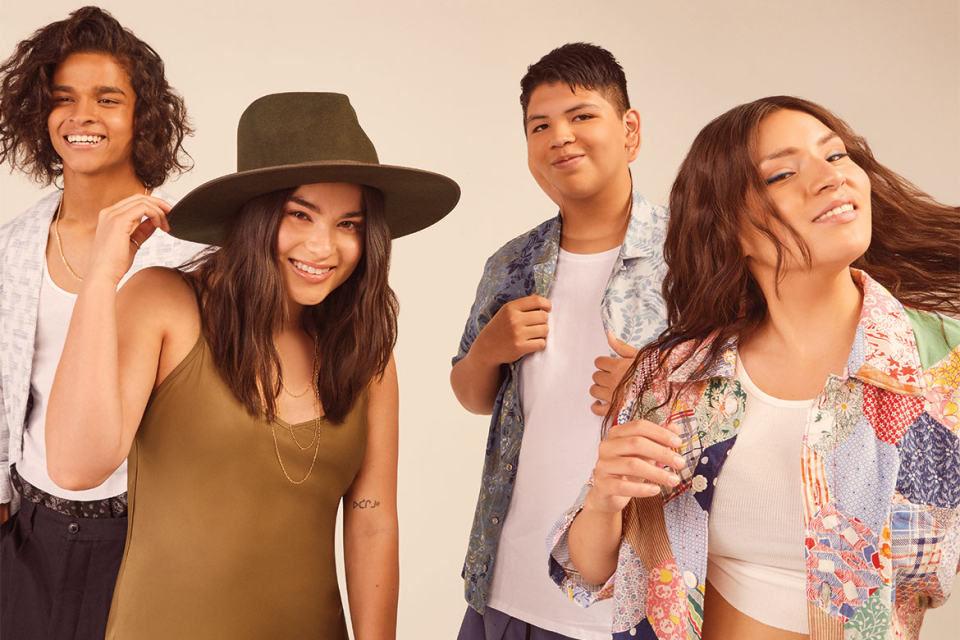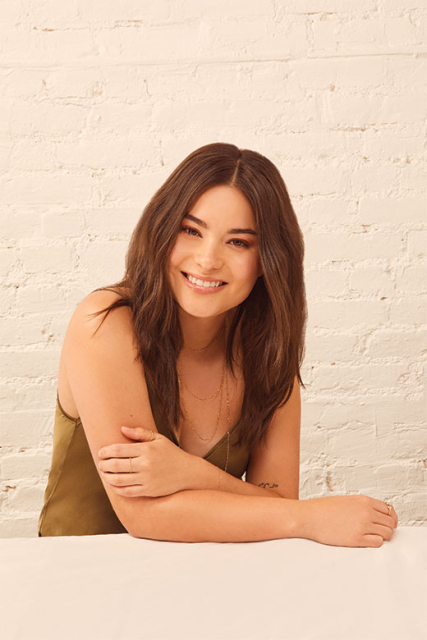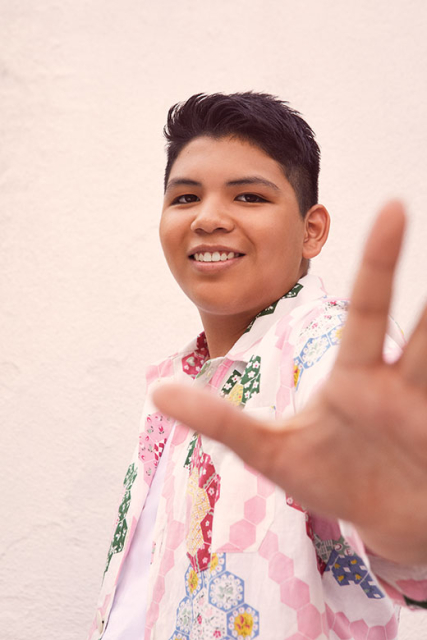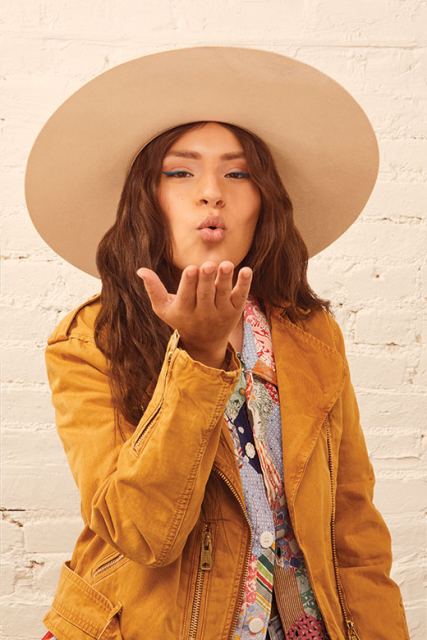When Indigenous filmmakers Sterlin Harjo and Taika Waititi began collaborating on a series idea about Native teens, they were resolute about a key element: unlike prior dramatizations of the Native experience, this one would be funny.
"We come from the poorest places on earth, but the way that you deal with being poor is through humor," Waititi says.
"Humor," Harjo concurs, "has really been absent from any depiction of us." Until now. Reservation Dogs, streaming on FX on Hulu, is a coming-of-age Native comedy. "It's the show I never thought I'd get a chance to make," Harjo says.
Set in a rural Oklahoma town, the series is based on Harjo's experiences growing up among his tribal communities — the Muscogee Nation and Seminole Nation — in Oklahoma. It follows four scheming teens who are mourning the recent death of their buddy Daniel, while trying to raise enough money through petty crime to escape their hometown for the promised land of California.
"They're a bunch of teenagers who don't know what they're doing," says Waititi, a New Zealander of Māori descent. "But they're trying something."
Harjo, who directed the indie films Four Sheets to the Wind and Barking Water, is showrunner of Reservation Dogs; he and Waititi are cocreators as well as executive producers. Waititi, a multihyphenate who directed Thor: Ragnarok and episodes of The Mandalorian, won an Oscar for the screenplay of Jojo Rabbit, which he also starred in and directed.
The all-Indigenous cast stars D'Pharaoh Woon-A-Tai (Creeped Out) as Bear, Devery Jacobs (American Gods) as Elora Danan, Paulina Alexis (Beans) as Willie Jack and, in his TV debut, Lane Factor as Cheese.
Longtime friends from the film-festival circuit, Harjo and Waititi began collaborating after the latter suggested they pitch something to FX, where Waititi — an executive producer and director on the FX vampire comedy What We Do in the Shadows — had a first-look deal. They fleshed out the story and characters over a night of libations.
The next day, Harjo sent over a pitch document. Given Waititi's heavily booked schedule, "I thought I'd talk to him in a year or so," Harjo says, only half-joking. A week later, he and his comedy group, The 1491s, were premiering a play in Oregon. As Harjo tells it, "I get a surprise call from my agent; they were like — 'What's Reservation Dogs? We have an offer for a pilot from FX.'"
Waititi had sold the idea to FX, where execs responded to the show's comic take.
"Normally, any show that has to do with Native communities is depressing," Waititi recalls. "Non-Natives have this idea that we sit around in nature talking to trees, getting the answers to life's questions from the wind and sage advice from the older members of the community."
FX ordered a pilot in November 2019. Waititi was supposed to direct it and other episodes, but the pandemic caused significant delays, and then, he says, "This tiny little project called Thor got in the way." Forced to bow out, he hunkered down in Australia to quarantine for preproduction on Thor: Love and Thunder, while Harjo helmed the pilot. In December 2020, FX greenlit an eight-episode season, and Harjo assembled a staff of all Indigenous writers, series regulars and directors.
"It was like a dream," he says. "I never thought this would get made, especially now, because everyone's looking for IP [existing intellectual property] and Taika and I just had this idea we invented out of the blue."
Reservation Dogs was Harjo's chance to put his stamp on a culture that has long lacked representation in Hollywood. "It's a comedy in a supposed rough neighborhood, but that's not what you get," he says, explaining that tonally, the Ice Cube comedy Friday was a major inspiration. "You get the color, the quirkiness, the community. There is danger, but it's not at the forefront.
"When you see a show or movie about Natives — usually made by non- Natives — the gaze is always on the poverty. What they don't understand is that isn't poverty to us. That's home."
Not surprisingly, Oklahoma — and its celebrated diversity — becomes a vital character on its own. "There's Blacks, Natives, whites; it wasn't segregated," Harjo says. "We all grew up together. We were friends, we were neighbors, and I wanted that to be reflected in the show."
Reservation Dogs — the title is a wink to Quentin Tarantino's landmark crime film Reservoir Dogs — was shot on location in Okmulgee, some 40 miles south of Tulsa and 60 miles from where Harjo grew up. Like Tarantino's film, the series is peppered with pop-culture gags and references. Willie Jack is named for the iconic Billy Jack film of the early 1970s; Elora Danan discovers that she's named for the baby in the 1988 fantasy film Willow.
The Reservation Dogs — who by the end of the pilot have reframed themselves as "cool vigilantes" — listen to hip-hop pioneers the Wu-Tang Clan, subsist on catfish and turn abandoned buildings into hideouts.
"Being able to adapt and move and evolve — that is the strength of Native people," Harjo says. But while the Reservation Dogs may be opportunistic small-town thieves, any similarities to Tarantino's hardened gang of criminals end there. As Woon-A-Tai observes, "We do commit petty crimes, but as the show goes on, it's less about that and more about our journey."
Jacobs adds: "The driving force behind the show is us as characters." And Alexis breaks it down: "Elora Danan and Bear are the leaders of the group. Willie Jack and Cheese tag along. Cheese is the baby brother we always protect... they're like a family. Survival and friendship."
The young cast members are fresh off a panel discussion at the Tribeca Festival when they assemble via Zoom for this interview. Though production has ended and the actors have scattered to separate cities, they present as a close-knit bunch, bonded by the shared experience of making a TV show together while enduring a pandemic.
"There were a lot of people who'd never acted before, who saw an opportunity," Waititi says. "Sterlin had a vision because he was already tapped into the community."
Much of the casting was done in Oklahoma and New Mexico, but audition videos came in from all over.
"I was blown away by how many good actors there were," Harjo says. "Hollywood has always said no one's interested in Native stories, or that it's too hard to cast a Native show. No, you just have to get out of L.A. and cast where Native people live."
Harjo, who's given to thoughtful contemplation, adds that Bear is the character closest to him, though he's quick to point out, "All the characters are based on people in my life."
For his part, Woon-A-Tai says, "I felt very connected to Bear, because I can see him in me — someone who's trying to figure himself out and trying to do the best he can, even if he's not always making the best choices."
Adding to Bear's confusion is his fractured home life; he lives with his single mother (Sarah Podemski) and is estranged from his struggling musician father, whom his mother dismissively refers to as "an out-of-work Indian rapper."
While Bear fancies himself the group's leader, it's tough-talking, unsentimental Elora who's more decisive.
"She's the moral compass of the group," Jacobs says. "She's working to make sure things get done — she's going to organize the crimes and rally the group together even when they don't like it." And though Elora pushes hard to get the gang out of its small town ("That's why Daniel's gone — 'cause this place killed him," she reminds her pals), Bear is hesitant. He feels the need to defend his turf from an influx of new rivals.
This push-pull — will they stay or will they go? — forms the heart of the show. But the conflict cuts deeper, Harjo says. "As anyone who's left home knows, when you're about to leave, everything you're going to lose gets magnified. That's what Bear's going through."
Jacobs knew she wanted to be part of the series after being impressed by Waititi's 2010 film Boy, about an 11-year-old who's obsessed with Michael Jackson. Because of her age (27), Harjo didn't initially think she was right for Elora. "But I gave my best in auditions and proved him wrong," she says with a smile.
"When I saw her with the other kids, I knew it would work," Harjo says. "We cast the show kind of like Coppola cast The Outsiders — people were swapping parts in the audition process."
Alexis, who also read for Elora, landed the role of streetwise Willie Jack, which was originally written for a boy — until she auditioned. Waititi recalls, "We were so blown away, we had to have her on the show."
"She's an Okmulgee daredevil — confident, dependable, grounded," Alexis says. "Kinda like me. She's what they call on the reservation 'solid.'"
The most genial and dryly humorous member of the group, Cheese, is also its most unformed. "He doesn't have any goals or dreams himself," Factor notes. "He follows whoever and does whatever anyone tells him to do." Of his first TV role, the 15-year-old admits, "Cheese and I are very similar in a lot of ways, from the way we act to the way we dress."
Some quirky Indigenous characters supplement the main cast: a conspiracy-obsessed police officer (Fargo's Zahn McClarnon), a pair of rapping twins (recording artists LiL Mike and Funny Bone) and a horseback riding, bare-chested warrior–spirit guide (Dallas Goldtooth), who appears to Bear in a vision after he's temporarily laid out by a paintball attack.
That warrior, a spoof on a familiar Native stereotype, claims to have fought at the Battle of Little Big Horn. "I didn't kill anyone," the spirit says to a wide-eyed Bear, "but I fought bravely." He goes on to admit that he didn't actually fight — but he did see Custer. And he imparts some Native wisdom to Bear before he departs.
"The warrior character is important for non-Native audiences — it lets you in on the joke," Harjo says. "We're making fun of ourselves, but also making fun of the depictions you've made of us. We're also making fun of ourselves for helping with those depictions — but we're showing some of it's true."
The vision scene also excited Waititi — for cinematic reasons. "When we flash to the spirit god, the format changes," he explains. "We used a vintage tilt-and-shift lens; it becomes more like a large-format camera. I found that visual style very beautiful."
As an Indigenous child growing up in Oklahoma, Harjo recalls that "every example of yourself being reflected on a screen is as zombies in a Western. Native people were meant to be the obstacles in the way of Western expansionism; we had to be wiped off the Earth."
Harjo hopes Reservation Dogs will encourage Hollywood to view the Indigenous community through a more comedic lens.
"It's hard for non-Natives to have a sense of humor about us," he observes. "Because of the history, society wants us to be victims, because it makes them feel like they can save us — but we don't need saving. We can handle our own problems, with our own humor. We just need the opportunities to be heard and be portrayed accurately — and FX is letting us do this."
Though Waititi was thousands of miles away in Australia, he still helped oversee production through daily Zoom meetings that — for him — would start at 1:30 a.m. and conclude some 12 hours later. "They'd have me on a little iPad they would carry around on set," he recalls, amused. "I was just being the annoying producer. 'Who's this guy, what's he doing? Why's he putting the camera there?'
"I was excited to see the ensemble working together," Waititi adds. "They were very watchable."
Ultimately, he was most excited to see his good friend Harjo take the reins on a series that is expected to be a trailblazer for Indigenous-centric comedies. "I'm very supportive of people in the Native community, because it's who I am," Waititi says. "It's one thing for me to support projects, but if it's my people, it's almost like my family — it makes it very special."
Executive-producing Reservation Dogs with Waititi and Harjo is Garrett Basch; the show is produced by FX Productions.
For more on the casting process for Reservation Dogs, click HERE; For more from the cast and creators, click HERE
This article originally appeared in emmy magazine, Issue No. 8, 2021















